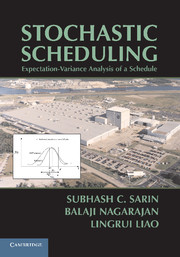Book contents
- Frontmatter
- Contents
- Foreword
- Preface
- STOCHASTIC SCHEDULING
- 1 Introduction
- 2 Robust Scheduling Approaches to Hedge against Processing Time Uncertainty
- 3 Expectation-Variance Analysis in Stochastic Multiobjective Scheduling
- 4 Single-Machine Models
- 5 Flow-Shop Models
- 6 Job-Shop Models
- 7 Parallel-Machine Models
- 8 The Case of General Processing Time Distribution
- 9 Concluding Remarks
- Appendix
- Bibliography
- Index
9 - Concluding Remarks
Published online by Cambridge University Press: 05 July 2014
- Frontmatter
- Contents
- Foreword
- Preface
- STOCHASTIC SCHEDULING
- 1 Introduction
- 2 Robust Scheduling Approaches to Hedge against Processing Time Uncertainty
- 3 Expectation-Variance Analysis in Stochastic Multiobjective Scheduling
- 4 Single-Machine Models
- 5 Flow-Shop Models
- 6 Job-Shop Models
- 7 Parallel-Machine Models
- 8 The Case of General Processing Time Distribution
- 9 Concluding Remarks
- Appendix
- Bibliography
- Index
Summary
The primary motivation for the work presented in this book has been to address the inherent variability of various parameters (e.g., job processing times and due dates, among others) that are encountered in the scheduling of tasks in a production environment and their significant impact on system performance. Variability in scheduling has been modeled in the form of random variables, and most of the work undertaken in this field has considered optimizing the expected value of the performance measure of interest. In doing so, very little importance was attributed to variability of the system, and consequently, very little significance was attributed to the variance of a performance measure. It is often seen that a scheduler's preference is not only for a schedule that has a lower expected value but also for a schedule that provides minimum variability. Hence, schedule evaluation must be performed in terms of both the expectation and the variance of the performance measure. The inclusion of variance in schedule optimization leads to complexities that, apparently, have resulted in a dearth of reported work in the literature as far as evaluating the variance of a performance measure is concerned. Our aim has been to develop closed-form expressions (wherever possible) and devise methodologies to determine the expectation and variance for different performance measures and in diverse scheduling environments, in the face of processing time variability. This effort would lead the way in considering variance issues in schedule optimization and determining schedules that are both expectation- and variance-efficient.
Information
- Type
- Chapter
- Information
- Stochastic SchedulingExpectation-Variance Analysis of a Schedule, pp. 153 - 156Publisher: Cambridge University PressPrint publication year: 2010
